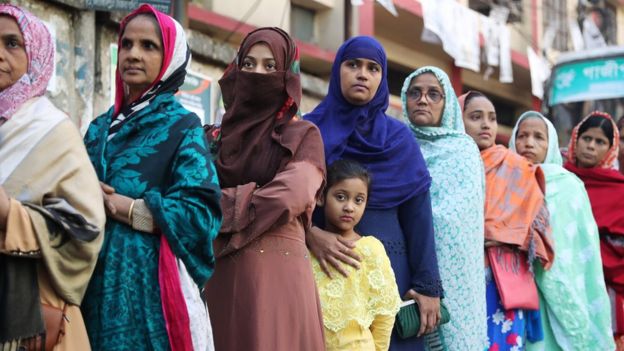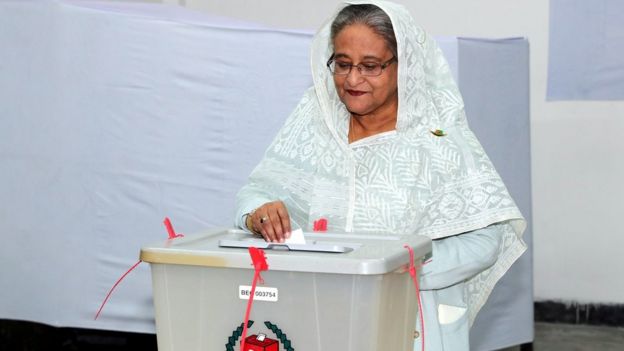31 December 2018 BBC
For the video CLICK
Prime Minister Sheikh Hasina has secured her third consecutive term with a landslide victory, Bangladesh’s Election Commission said on Monday.
Her ruling party and its allies have won 288 of the 300 parliamentary seats contested, surpassing its previous election wins.
The opposition has condemned the vote as “farcical,” marred by violence, intimidation and vote rigging claims.
They won just seven seats and have demanded a new vote.
Bangladesh’s parliament has 350 seats in total, 50 of which are reserved for women and allotted proportional to the overall vote.
“We urge the election commission to void this farcical result immediately,” opposition leader Kamal Hossain said.
“We are demanding that a fresh election is held under a neutral government as early as possible.”
The Bangladesh Election Commission told Reuters news agency that it had heard vote-rigging allegations from “across the country” and would investigate.
At least 17 people have been killed in clashes between ruling party supporters and the opposition.
What are the allegations?
Sheikh Hasina’s Awami League has run Bangladesh since 2009, but one of the leading opposition parties has accused it of using stuffed ballot boxes.
A spokesman for the Bangladesh National Party (BNP) alleged there were “irregularities” in 221 of the 300 seats being contested.
Soon before polls opened, a BBC correspondent saw filled ballot boxes at a polling centre in the port city of Chittagong. The presiding officer declined to comment.
Only ruling party polling agents were present at that and several other polling centres in the second-largest city of the country.

Image copyright Reuters Image caption Voters queue in the capital, Dhaka
Human Rights Watch South Asia director Meenakshi Ganguly said on Twitter that “with serious allegations of voter intimidation, restrictions on opposition polling agents and several candidates seeking a re-poll, there are concerns about the credibility” of the election.
At least 47 candidates from the main opposition alliance withdrew before polling closed, alleging vote rigging and intimidation.
Activists, observers and the opposition party had warned that the vote would not be fair, but the governing party accused the opposition of peddling false claims.
Ms Hasina told the BBC on Friday: “On the one hand, they are placing allegations. On the other hand, they are attacking our party workers, leaders. That is the tragedy in this country.”
‘Too scared to speak out’
Yogita Limaye, BBC News, Dhaka
As we went from polling booth to polling booth on Sunday, one pattern became clear. People who were supporters of Prime Minister Hasina’s party were vocal, and happy to answer our questions on camera, about what issues they’d voted on. The others were mostly too scared to speak out.
One man told us that several members of his extended family found that their votes had already been cast when they went to the polling booth. He said he didn’t think it was a fair election but didn’t want to be identified.
It wasn’t hard to see why he felt intimidated. Outside every polling booth we went to, there were dozens of workers from the prime minister’s party, listening intently when anyone was interviewed. No-one from the opposition parties was visible.
While the election commission has said it will investigate claims of vote-rigging, the organisation has itself been accused of bias by the opposition.
So far, the prime minister has not responded to these latest allegations but two days ago rejected claims the election was unfair.
It was widely anticipated that her party would win the polls, but it will be a controversial victory.
Why was this election important?
Bangladesh is a Muslim-majority nation of more than 160 million people and faces issues ranging from possibly devastating climate change, Islamist militancy, endemic poverty and corruption.
The country has recently been in the international spotlight as hundreds of thousands of Rohingya Muslims have fled there from neighbouring Myanmar.

Image copyright Reuters Image caption PM Sheikh Hasina, who has been in power since 2009, casts her ballot on Sunday
The lead-up to the election saw violence between rival supporters and a crackdown on dissent by a government that critics say has only grown more authoritarian during its 10 years in power.
Who were the contenders?
Sheikh Hasina’s long-term rival, Khaleda Zia, was sent to prison on corruption charges earlier this year and barred from competing in the vote, in a case which she claimed was politically motivated.
In Ms Zia’s absence, Kamal Hossain, who was previously both an AL minister and Hasina ally, leads the main opposition grouping, the Jatiya Oikya Front, which includes Ms Zia’s Bangladesh National Party (BNP).
However, the 81-year-old lawyer, who drew up the country’s constitution, did not stand in the election.
The BNP boycotted the last vote in 2014, making Sunday’s poll the first to involve all the major parties in 10 years.
